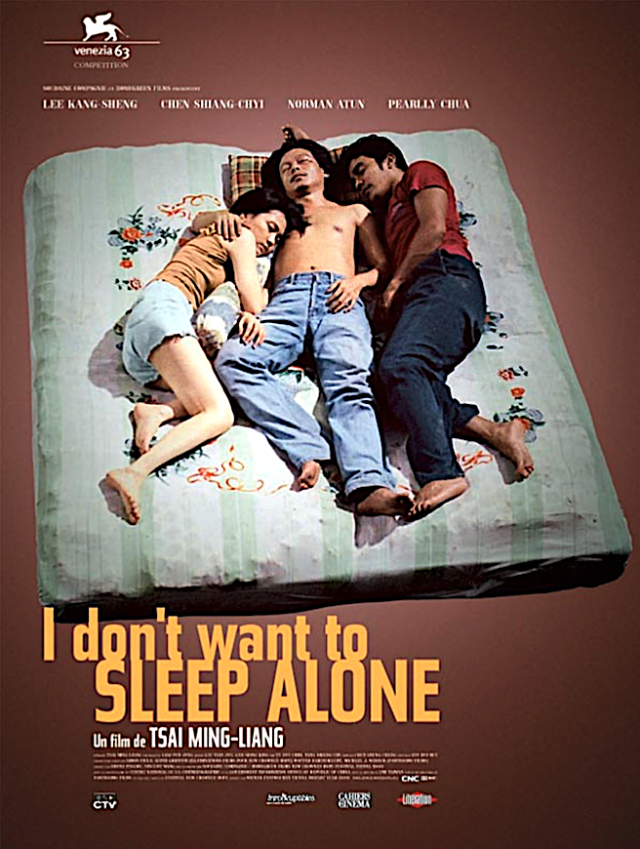By Robert St. Martin

Santa Monica, CA (The Hollywood Times) 8/2/24 – Wednesday evening at the Aero Theatre in Santa Monica was the beginning of a 16-film retrospective of the work of Taiwanese auteur Tsai Ming-liang. The director was there for the screening along with his muse and lead actor Lee Kang-sheng – and the two will be present for much of the retrospective. Paired with Tsai Ming-liang early film and critical success Vive L’Amour was a film from his middle period in Malaysia – I Don’t Want to Sleep Alone (2006).
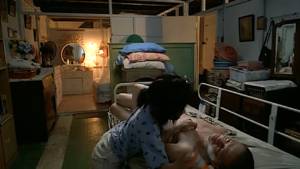
Writer/director Ming-liang Tsai has returned to Malaysia, the country of his birth, for the first time to make this film, but he carries forward themes that have characterized previous works. The intense tropical heat of Kuala Lumpur matches the sultry, melancholy gaze on a disparate group of five people largely abandoned by society trying to find comfort with another person. Kuala Lumpur is introduced via its street cooks, vendors and hustlers, one of whom has the mute Hsiao Kang beaten when he does not pay for the “numbers” which will win him money.
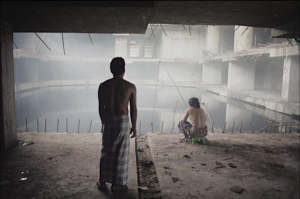
In Kuala Lumpur, this homeless man Lee Kang-Sheng is beaten and robbed. Some Bangladeshi workers are moving a musty old mattress that they just found out on the street. There they discover the beaten Chinese man. Hsiao Kang is taken to the makeshift home of Bangladeshi migrant laborer Rawang (Norman Atun). Meanwhile, a coffee shop owner (Pearlly Chua) cares for her paralyzed son (also Lee Kang-Sheng) while both she and her waitress Chyi (Chen Shiang-Chyi), “What Time Is It There?”). We never know what Rawang is thinking but he takes great care of the recovering victim and puts him in bed with the mattress covered by mosquito netting.
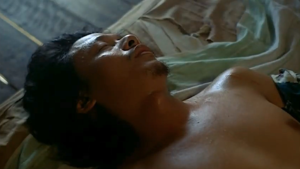
There he feeds, baths and cares for the man in silent scenes that need no words (Ming-liang’s film is largely silent after its opening shots). A sexual longing is hinted at, but not overtly stated. Given the loving care Rawang gives the battered body of the homeless man, it is possible that Rawang is actually thinking “I Don’t Want to Sleep Alone.”
Paralleling Rawang’s efforts is a woman who cares for her disabled son, fed through a feeding tube, bathed, massaged with care. They are watched from above by Chyi, who works for the woman in a coffee shop and who is trying to connect with Kang (played by the same actor). In one of the film’s few other talking scenes, we learn that the coffee-shop Lady Boss’s second son (Samantha Toh Su-Yee) is coldly trying to sell their home and business out from under them. Into this bleak world comes a sickly haze from forest fires in nearby Indonesia (PSI index 650+ we hear on the radio), from which everyone must mask themselves (with everything from scarves to instant noodle bowls) even as they are trying to have intimate sexual contacts.
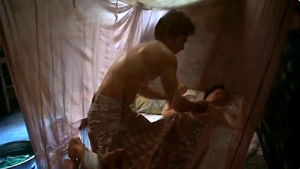
I Don’t Want to Sleep Alone has another character in the abandoned construction site the director found as his set (‘All we did is light it’). He shoots a number of silent reflections in its water-filled central amphitheater – the Bangaleshi laborer eating lunch, Kang fishing. Using his trademark static camera shots, Ming-liang breaks up the space, and subsequently his action, with the interior architecture of this building.
Tsai’s continuing obsession with all things liquid (especially apparent here via the ethereal pool in an abandoned construction site that holds a kind of cosmic sway over the film’s main trio) hints at something more disturbing that seems to echo the forbidden zone of Tarkovsky’s Stalker and the watery mise-en-scene of Nostalghia. There are two Hsiao-kang characters, and one is left to wonder if one Hsaioi-kang is a projection of the other. Hsiao-kang has become little more than an emptied-out, barely existent schematic, going through a dual series of symbolic and somnambulant motion – something quite intentional on Tsai’s part.
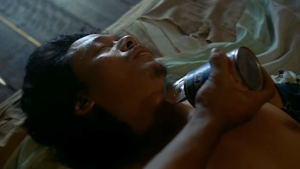
And then there is the devoted massaging of the coffee shop owner of her comatose son’s body, with its illness-cum-incest themes that also pervade Tsai’s masterful film The River. Riding over this secondary plot for Atun’s stellar performance as Rawang. His standout moment: a tear-stained, jealousy-fueled close-up as he presses a jagged-edge can against Hsiao-kang’s neck. It is as uncompromised a vision of unrequited love as you can find in a film and rendered, as is Tsai’s forte, with a sublimely palpable queer tenor.
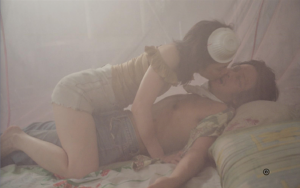
The film greatly explores the cravings and desires every human being wants. The worker Rawang isolates himself from his peers and makes room in his dwelling for the homeless man. The mute homeless man follows the waitress and eventually, the lady boss had sex with the homeless man at the back alley. Tsai uses the emotional world of ordinary human beings to explore the desires and cravings through something that is often missed out from the daily life.

Aspects of this film share some thematic threads with a similar film – Apichatpong Weerasethakul’s Syndromes and a Century (also 2006), a Thai film. Both films were commissioned by the City of Vienna to celebrate 250 years passing since Wolfgang Amadeus Mozart’s birth. Here, there’s actually a snippet of his music (from The Magic Flute), alongside a panoply of contrasting song styles – Malaysian folk music, Chinese opera, antique Canto-pop, and Bollywood showstoppers–that take the place of dialogue in this choreographed dream of subcultures groping toward each other through the haze.


